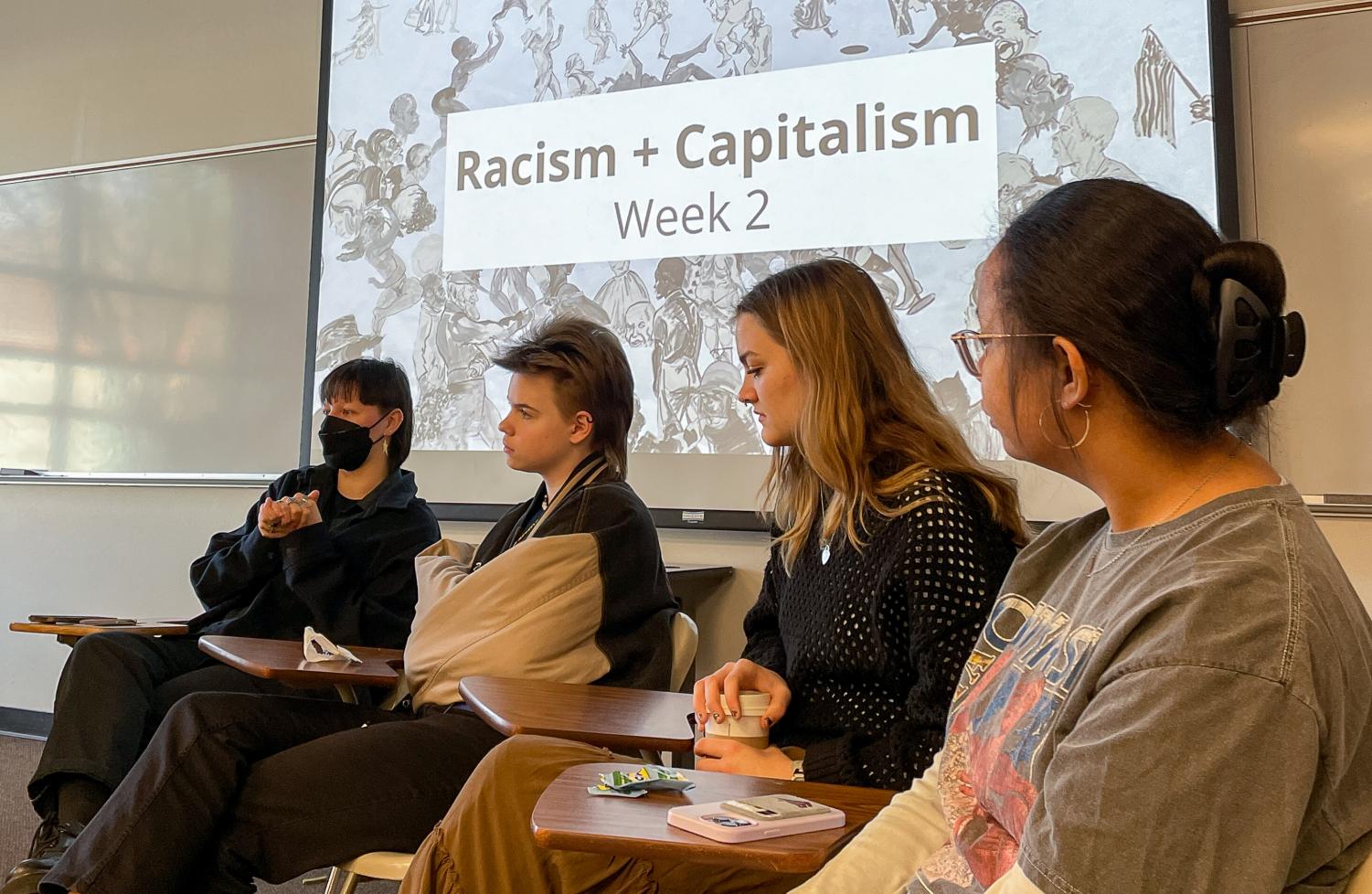Weaving in context
Catalyst fosters place for conversation, understanding as they prepare for spring In Context workshops on racial capitalism
April 14, 2023

Context is the fabric of our lives. Through it, stories are woven with different textures and variation. Sometimes the fabric fades or becomes broken. Using what we know, communities can darn and repair, becoming more than a single thread’s effort.
But something is wrong. While the practices of community development and empathy seek to fix brokenness, why does brokenness exist?
Catalyst is Seattle Pacific University’s intercultural initiatives committee, working with the Associated Students of Seattle Pacific to address issues of race, ethnicity and justice. Every quarter, Catalyst hosts a workshop series called In Context.
Rae Perez, a third year English literature and social justice major, is Catalyst’s education programmer.
“I run In Context, which is a six-week program discussion series workshop on racial capitalism, moving towards a conversation that doesn’t just root us in the history of racial capitalism, but looks presently at our realities and also dreams of a different future,” Perez said.
The first three weeks of the program introduce the topics by asking questions. What is racial capitalism? How did the United States get here? What is race? What is racism? It begins by approaching the historical progression of race and how it has developed into our contemporary understanding of the issues at large.
Weeks four, five and six are called “dreaming about the future.” Rather than asking questions about how things are, the discussion shifts to asking questions about the future.
“What does solidarity look like? How do we push towards coalitional politics? We’ve existed in this very ideological headspace, so what can we do right now?” Perez said. “We talk about ways to fortify our community, ways to help and support people in ways that their needs can be met, not in ways that we think that they do.”
It is a challenge, and sometimes, people can be afraid to mess up. However, since In Context happens in community, these hard questions become down-to-earth and approachable.
Jasmine Bowles, a freshman psychology major, participated in In Context this past winter.
“You don’t have to go in with a lot of knowledge about these kinds of things. I had almost no knowledge at all about the origins of racism or race or how capitalism is in relation to it,” Bowles said. “Anyone from anywhere could get something out of this, especially students wanting to connect more with others on campus and maybe have a better understanding of what others are going through. It promotes empathy.”
Distinct from the seriousness of the topic, the community of In Context demonstrates change with conversation.
“It was so casual. I walk into Bertona one, and people are catching up, talking about classes, and there were veggie straws. It was not at all the overbearing conference situation I thought it was gonna be,” Bowles said.
These kinds of welcoming spaces help include and alleviate the different dispositions participants may find themselves in.
AJ Setala, a first year Spanish major and facilitator for In Context, shared their first experience.
“I came into it feeling very hopeless. As somebody who has experienced white privilege my entire life and seeing how corrupt and stacked everything is against minorities, I came in with hopelessness and grief. But I took away from my first quarter a hope that we can change within our communities and that it can have a tidal wave effect if we connect on personal levels to love each other and commit to mutual aid,” Setala said.
Communities must grow together and never at the cost of an individual. Recognized within the larger discourse of national politics and justice is a scrutiny for rightness and wrongness. Based on the subjects discussed at In Context meetings, Perez concludes that cancel culture is very real, and there becomes a chilling effect where we then hesitate to talk about these topics.
“It’s recognizing the accountability and role of not canceling people,” Perez said. “That is punitive justice. In Context is one of those spaces where we are able to practice the habit of not ruling someone out because they messed up.”
When people repair their work, it does no good to rip a thread out for its mistake. Rather, they repair weaknesses with others for even stronger bonds.
The presence and damages of racial capitalism assumes that the whole fabric must be replaced, that the entire system is messed up and must be thrown out. However, the dream is not to destroy society, it is to change it. Each thread makes an amendment. In Context is one of those threads. Hopefully, with enough small changes, the old fabric could become a tapestry of something new.
“By not assuming that the systems we have are fixed, radical imagination equips us to see hope in the future where everybody can come alive with their dreams,” Setala said.
In Context will run from weeks four to nine on Wednesdays from 4 p.m. to 5:30pm. Meeting dates are April 19, April 26, May 3, May 10, May 17 and May 24.
To register for spring quarter’s workshop, sign up here. And for more information, email [email protected].
























































































